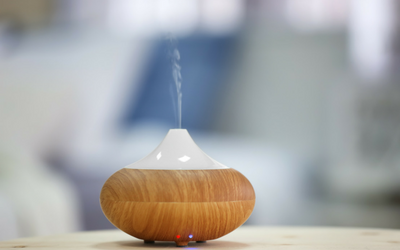
There have been a lot of stories in the news over the past few weeks about the effects of essential oils used in diffusers on pets.
Essential oils are the concentrated liquids of plants. They are popular in aromatherapy, alternative medicine, as additives in cleaning products and personal care products, as well as home air fresheners.
Many people use essential oil diffusers to improve their health. Lavender is said to help with relaxation and sleep, while eucalyptus and peppermint oils help to clear a stuffy nose when you have a cold.
But just how safe are these oils for our pets?
Pets (as well as humans) can experience chemical burns with the direct contact of essential oils onto the skin. If pets lick up spills of these oils, they can experience chemical burns and other toxic effects. Cats are especially sensitive to many essential oils and even just a couple of licks can be harmful.
Many essential oils, such as eucalyptus oil, tea tree oil, cinnamon, citrus, pennyroyal, peppermint, pine, sweet birch, wintergreen, and ylang ylang are toxic to pets. These are toxic whether they are applied to the skin OR used in diffusers.
Oil from diffusers can still be harmful since the diffuser uses water vapor to diffuse tiny oil droplets into the air. Inhaling diffused oils can cause aspiration pneumonia if the diffuser is used in a small space or if it is used for a long period of time, as well as other toxic effects.
If you are using a diffuser in your home, the best option is to use it in an area that your pet cannot access AND check with your veterinarian about the types of oils that are safe to use. If however, you have a pet with breathing problems, using a diffuser anywhere in the house is not a good idea.
You may want to reconsider the use of an oil diffuser if your home has pet birds, kittens, or curious cats. Birds have a sensitive respiratory tract and are negatively affected by inhaled toxins. Kittens and curious cats may accidentally knock the diffuser over causing the oil to spill. If the oil gets onto the cat’s fur (which the cat could later ingest while grooming), or the cat licks the spill, harmful toxic effects can occur.
Keep in mind that cats and dogs are much more sensitive to scents – a dog’s sense of smell is somewhere between 1,000 to 10,000 times better than ours! What we may think is a mild scent may be overpowering to a dog or cat. So even though the essential oil you may be using is not toxic to a pet, it may be overwhelming for them.
If your pet gets oil on its skin or fur, wash it off as quickly as possible using hand dishwashing soap. If you think your pet has consumed essential oils, or may be having a reaction from being exposed to essential oil vapors, take your pet to the veterinarian right away.
Keep all essential oils out of reach of curious pets at all times. Sweet smelling liquids may tempt your pet, so never leave essential oils unattended. Never apply essential oils to your pet without consulting with your veterinarian first. Check with your veterinarian to see if the oil you are using in your diffuser could cause harmful effects in your pet.
